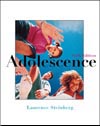| Major Section | Study Guide Features |
| | |
| I. Autonomy as an Adolescent issue | Learning Objectives: 1 |
| | Important terms: Autonomy Multiple choice questions: 1-3 Fill in the blank questions: 1, 6 |
| | |
| II. Three Types of Autonomy | Learning Objectives: 2 |
| | Important terms: emotional autonomy, behavioral autonomy, value autonomy Multiple choice questions: 6, 7, 23 Fill in the blank questions: 3 Matching questions: 4, 7, 12 |
| | |
| A.The development of emotional | Learning Objectives: 3 |
| | autonomyImportant terms: Anna Freud, detachment, individuation, de-idealization, Peter Blos Multiple choice questions: 4, 5, 8, 24, 25, 34 Fill in the blank questions: 4-5 Matching questions: 5, 8, 13, 20 |
| | |
| B.Emotional autonomy and | Learning Objectives: 4 |
| | parenting practicesImportant terms: enabling behavior, constraining behavior Multiple choice questions: 9, 26, 27, 35 Fill in the blank questions: 7-9 Matching questions: 1, 16 |
| | |
| III. The Development of Behavioral Autonomy | |
| | |
| A. Changes in decision-making ability | Learning Objectives: 5 |
| | Fill in the blank questions: 22 |
| | |
| B. Changes in conformity and | Learning Objectives:5-6 |
| susceptibility to influence | Important terms: peer pressure |
| | Multiple choice questions: 10-12, 28 Fill in the blank questions: 10, 11, 23 Matching questions: 9 |
| | |
| C.Parent-Child Relations | Learning Objectives: 5 |
| And Adolescents' Peer Orientation | Important terms: ecology of human |
| | development, microsystems, mesosystems, exosystems, macrosystems Multiple choice questions: 13-14 Fill in the blank questions: 12, 13, 15, 24 Matching questions: 3, 10 |
| | |
| D. Changes in feelings of self-reliance | Learning Objectives: 5 |
| | Important terms: self-reliance Fill in the blank questions: 14 |
| | |
| IV. The Development of Value Autonomy | |
| | |
| A.Moral development during | Learning Objectives: 7 |
| adolescence | Important terms: Lawrence Kohlberg, |
| | preconventional moral reasoning, conventional moral reasoning, postconventional moral reasoning, prosocial moral reasoning Multiple choice questions: 15-18, 20, 21 Fill in the blank questions: 16-18 Matching questions: 2, 6, 11,17, 19 |
| | |
| B.Do Men and Women | Learning Objectives: 8 |
| Speak About Moral Problems | Important terms: justice orientation, |
| | "In A Different Voice"?care orientation, Probably Not, After All.Carol Gilligan Multiple choice questions: 19, 31 Fill in the blank questions: 19 Matching questions: 14, 15, 19 |
| | |
| C. Political thinking during Adolescence | Learning Objectives: 9 |
| | Multiple choice questions: 22 Fill in the blank questions: 20 |
| | |
| D.Religious beliefs during adolescence | Learning Objectives: 9 |
| | Multiple choice questions: 32-33 Fill in the blank questions: 21, 25 |



 2002 McGraw-Hill Higher Education
2002 McGraw-Hill Higher Education